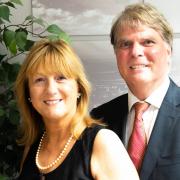A cast-iron work ethic drove Marcus Gomery from a car wash kid to Managing Director of one of Gloucestershire’s leading financial planning companies. Tanya Gledhill meets him

Marcus Gomery messed around at school. He came out with two O Levels - Maths and English language, the “core ones” - and a handful of CSEs. In physics, he learned to wire a three-pin plug. How he got through art is still a total mystery to him. But what he lacked in attention span and enthusiasm for his academic studies at the Forest of Dean Grammar School, he made up for with work ethic when he left at 16: a steely desire to be better, to push himself, to succeed, to earn. It’s why he’s been at the helm of Brunsdon Financial Services Ltd (Brunsdon), the Gloucester-based financial advice company, since 2002.
His was an unconventional route into finance: as unconventional as a red BMW in a Coleford car park can be. Raised in a council house in the market town, Marcus joined the Youth Training Scheme, one of the thousands of youngsters who made up Thatcher’s so-called Maggie’s Army.
“I decided in the summer holidays that I needed to get a job, so I joined a YTS scheme and never went back,” he says. “It was £27 a week, full-time, and I managed to get in with the electricity board. They paid me £10 extra out of their own money, so I was on £37 a week and felt rich, but I’ve always worked hard.
“While I was at school I worked in a garage cleaning cars, so when I left, I worked at the MEB five days a week and cleaned cars on Saturdays.”
By the time he was 19, Marcus was bored with selling cookers and washing machines and had landed a sales job at the Rover garage, Watts of Lydney. From there, he moved to Five Acres in Coleford, a Hyundai and Isuzu dealership.

“Car showrooms are so boring,” he laughs. “You just have to sit there waiting for people to come in. Except I tried to be proactive. It’s how I got into this. Selling Hyundai and Isuzu was a challenge in itself at the time. I was about six months into that and was just totally bored, so one day I photocopied a magazine page and wrote on there ‘For a great deal, come and see Marcus at Five Acres garage’.”
He printed 100 and went to a nearby car park, stuffing them under windscreen wipers.
“I remember it like it was yesterday,” Marcus says. “There was this red five series BMW, and I was putting it on the windscreen, and this voice shouted, ‘Oi! get that off my effing car’. I turned round and it was my cousin. The last time I’d seen him was a couple of years before and he was working in a factory. He said he worked at Pearl Assurance.”
Marcus’ only experience of the savings plan market was Terry from Pearl Assurance who had, for years, come round each month to collect money from his mum. Seduced by the promise of car and mortgage allowances, he asked his cousin to get him a job, and one interview later, he was hired. Except he was only 19, and the company required him to be 20. So, while Pearl Assurance kept the job open for him, he spent six months using his MEB retail experience to work at Dixons in Chepstow. And his career in financial services was born.

From Pearl Assurance, Marcus went to Allied Dunbar as a financial adviser and then on to Towry Law. Typically, it wasn’t long before he became rather disillusioned with financial services, but he met a friend who worked for Brunsdon and the rest, as they say, is history.
“I liked it because it wasn’t like the corporates,” reveals Marcus, now Managing Director. “And that’s why I still like it today. Anyone can come across to me if they’ve got an idea, and talk to me. And they do, all the time.”
Brunsdon employs around 30 staff at its glass-fronted offices in Goodridge Avenue. It’s a far cry from the city centre building Gilbert Brunsdon called home when he set up the business to provide farmers with insurance in 1932. His watchwords of integrity, value and service are still at the heart of the company today which has grown exponentially over the past 86 years.
Now, there are three clear companies: Brunsdon Financial Services Ltd, it’s authorised representative Brunsdon Employee Benefits Ltd and Brunsdon Asset Management Ltd and its impressive client base includes everyone from high net worth individuals to household name blue chip companies.
“We look after a lot of money for people,” says Marcus. “So it’s a responsible job.”
One of the aspects which underpins the business is the subject of the ageing population. “People are worried how long’s their money going to last,” he says. “It’s a massive issue. People are living so long. The first 150-year-old is probably about 10 years old now, because they’re curing everything. But it’s got a massive knock-on effect as to how we’ve got to take care of people.”
Marcus argues the word “retirement” will soon become obsolete. “For the first time in this country, we’ve got more over-60s than under-16s alive,” he says. “So they’re getting older and there are fewer kids coming through. I mean, my dad is one of 11 and mum one of six. That just doesn’t happen any more.”
When it comes to cashflow forecasting - a major part of Brunsdon’s business - the discussion is now no longer about a man who retires at 60 and dies at 69, but one who retires at 60 and may live to 90. Or works until 75. It’s fluid.
“Retirement is expensive,” says Marcus. “Apart from walking, there’s not much you can do for free. I mean, that’s a great hobby, but if you want to go out and do things, that costs a lot of money. I think the term ‘retirement’ is going to disappear. There just won’t be a retirement date like there used to be. It’s just going to be what your lifestyle allows you to do. We have some people who have lots of money who don’t need to work. Then we have people who want to step out of the busy corporate but like working, so go to B&Q two days a week. And there are a lot of people who do the same job but just go part-time. Some get it really right and some people get it really wrong.
“There are some people who stop work and you go and see them six months later and they’ve aged 10 years. There are guys wearing big thick cardigans indoors because they don’t want to put the heating on. Or people who go to Sainsbury’s every Thursday because that’s their big day out, because they haven’t got the money to do the things they wanted to.”
Mindset and planning are vital for a successful retirement, says Marcus. Before this seismic social change we now find ourselves in, retirees would need most of their money in the first 10 years - cash to spend on exotic holidays, socialising and new cars. After that “fun period”, their financial needs would decrease.
Now, for our ageing population, care fees have to be factored in - everything from paying gardeners and cleaners to care home fees. And the costs can go up in the latter years of retirement, instead of down.
“It’s a nice problem to have that you’re going to live longer, if you can make sure you’ve got some kind of income to maintain that,” says Marcus. “It’s really difficult, and it’s really different. The reality is, most people can’t save enough.”
The conversation weaves between the demise of final salary pension schemes, the likelihood of a second Brexit referendum, the rise of “Terminator” robots and AI, under-funding in the NHS and why anyone would pay £5 for a takeaway coffee. He predicts equity release will become more commonplace for older homeowners and wonders whether we’ll switch to a more European-style housing model - i.e. different generations of the same family living in one house, to reverse the pension black hole. The housing market, he says, is often the single biggest factor in our failure to plan for retirement. He says 20-year-olds now should be saving a significant proportion of their income for their later years; by the time you hit 40, it should be 20%.
Did he then practice what he preaches now, I ask him? He laughs. “When I left the MEB, I had about £300 in my pension pot and I had to take it with me,” he says. “They wouldn’t let me leave it in there. So I spent it on a holiday to Spain - I mean, I didn’t even think about it.”
The average investment for a Brunsdon Financial Services client is around £250,000, but the company’s job now is not just about taking someone’s money and reviewing their circumstances every year. Now, the conversations are much more in-depth. It’s about planning for the future.
Brunsdon has its own investment funds, the IFSL Brunsdon Investment Funds*, which comprise two funds, the IFSL Brunsdon Cautious Growth Fund and the IFSL Brunsdon Adventurous Growth Funds. The most recent fund factsheets can be found here.
Clients get the chance to meet the fund manager once a year. And Brunsdon’s employee benefits authorised representative, Brunsdon Employee Benefits Ltd. is growing significantly as Marcus and his team implement auto-enrolment and persuade employers of the two-way benefits of offering workers healthcare and other perks, noticeably a quicker return to work following bouts of illness or injury and better staff retention. These are big businesses, including the likes of blue chip companies and a care industry organisation employing 30,000 people for whom Brunsdon runs the pension scheme. Ninety per cent of these clients have come through recommendation. It’s all, says Marcus, because of the service Brunsdon provides and its insistence on “smart broking” - aligning schemes to make life easier for the employer.
To that end, the work-life balance is at the forefront of Marcus’ priorities for his staff, all of whom get 30 days’ holiday after five years’ service, their birthday off, extra days at Christmas and a summer fun day.
Brunsdon has grown its business largely through referral. The firm barely does any advertising, save for one liveried taxi once “bombing around Gloucester” and a box at Gloucester Rugby. “Because there’s nothing else to do in Gloucester,” he jokes. “It’s very low key. It’s known as the party box because we’re usually the last to leave. But we don’t take people there to win new business. It’s a nice thank you for our existing clients.”
When he’s not in the office, Marcus loves spending time with his son Kayden, seven, and watches his beloved Liverpool FC, for which he has a season ticket at Anfield. He loves playing golf, too - he describes himself as an “enthusiastic, poor golfer” at his local club, Cotswold Hills - and heads off to Portugal each year with a group of friends to play.
It’s why Brunsdon is holding a charity golf day this autumn and has held successful charity golf days in the past. This year, it will raise money for the Pied Piper - a children’s charity which raises funds to improve the children’s ward at Gloucestershire Royal Hospital and provides transport solutions and medical equipment to life-limited children across the region. One hundred golfers will hopefully raise approximately £10,000 for the cause at Tewkesbury Park Hotel later this month - a sum Marcus is justifiably proud of.
Each year, staff are given the chance to choose three charities to support, and to date, £100,000 has been raised for good causes through Brunsdon’s fundraising foundation Heartfelt.
This marathon-running, zip-wiring, wing-walking, mountain-climbing attitude of Marcus and his staff defines the driving success of the company. “We have a saying here,” says Marcus. “That you’re only as good as your worst day. So that makes us make our service very good indeed.”
__________________________________________________
*There are two Funds, the IFSL Brunsdon Cautious Growth Fund and the IFSL Brunsdon Adventurous Growth Fund. Both are sponsored by Brunsdon Asset Management Ltd. and both are sub-funds of the IFSL Brunsdon OEIC (Open-Ended Investment Company). The Funds are hosted by IFSL Investment Fund Services Ltd.), part of the Marlborough Group, a subsidiary of UFC Fund Management plc. IFSL is authorised and regulated by the Financial Conduct Authority. Active management of the Funds is entrusted to Brooks Macdonald, a specialist in the relative risk return arena. The IFSL Brunsdon OEIC may not be suitable for very low risk or very high-risk investors. Potential investors should read the Key Investor Information Document before investing. Please note that past performance is not a reliable indicator offuture performance. The value of your investment and any income from itcan go down as well as up. You may not get back the amount originally invested. Please also note that tax treatment depends on individual circumstances and may be subject to change in the future. Changes in rates of exchange may have an adverse effect on the value of an investment. Changes in interest rates may impact the value of fixed interest investments within the fund. The value of your investment may be impacted if the issuers of underlying fixed interest holdings default, or market perception of their credit risk changes.
** Please note that the original article published by Cotswold Life September 2018 contains certain inaccuracies that this adapted article has addressed. The views and opinions expressed in that article are those of Marcus Gomery and have been edited by Cotswold Life Magazine. They do not necessarily reflect the views of Brunsdon Financial Services Ltd.
Please note that this article does not constitute specific personal advice. The views and opinions expressed in this article are those of Marcus Gomery. They do not necessarily reflect the views of Brunsdon Financial Services Ltd. Brunsdon is not responsible for the content of third party web sites.



























